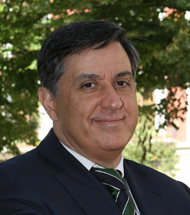"The challenge of forensic sciences is to provide justice with irrefutable evidence".
Despite stereotypes, "the 'CSI effect' has given visibility to our work", says forensic scientist Fernando García, director of a course organized by the University of Navarra.

PHOTO: Courtesy
"The challenge of forensic sciences would be to be able to provide Justice with irrefutable evidence that would serve as the only means of test". So says forensic scientist Fernando García Colina, PhD in Chemistry of BCN Forensics and director of a summer course organized by the University of Navarra that is being held this week at Civivox Condestable.
According to this expert, there have been major advances in forensic sciences in recent years, necessarily linked to the development of science and technology. "There are increasingly faster and more accurate methods of analysis. But the final challenge would be to move towards infallibility and irrefutable evidence. For the moment this is an ideal status , although technology, as well as science, will surely bring us surprising discoveries that will promote radical changes in society and, likewise, in Forensic Science."
On the other hand, he explains that the recent development of forensic science has been, among others, promoted by the incorporation of new areas of knowledge. "We can speak today, therefore, of forensic sciences, and not of forensic science, as the sum of knowledge from different areas, which are of interest for the assistance of Justice".
Realities and myths of series like CSIHe also refers to the effect of series such as CSI." They promote many stereotypes, for example regarding DNA analysis or the determination of a poison, which normally takes days or weeks, and in the series it is done instantly". However, he assures, they have promoted an increase in the knowledge of the work of forensic scientists, and of the issue of students who study these disciplines. He also points out that lawyers are wary of the "CSI effect" in jury trials, since "their members may ask 'why wasn't everything examined,' even though it's not possible.
"Naturally, the TV series doesn't give us the real picture of the day-to-day work of CSIs. We have no choice but to accept certain licenses if we want to be able to see how forensic work is done," he adds.
Regarding the differences between countries, he points out that the laws under which forensic services operate delimit their mode of action. "The Anglo-Saxon legal context favors more the intervention of the forensic scientist, while that of Roman origin leaves it more in the background, giving greater prominence to legal aspects." Despite the fact that many police investigations cannot be understood without the application of forensic science for their resolution, "this is not sufficiently recognized in Spain.
The course "Introduction to Forensic Sciences", which is also directed by the professor of the School of Sciences José Ramón Isasi, will be attended by chemists, experts in material sciences, biologists, doctors and engineers, who will talk about trace analysis, forensic analysis of DNA and biological remains, or forensic medicine, among others, as well as members of the area of research Criminal and Scientific Police Division of the Policía Foral or the high school Navarro de Medicina Legal.
